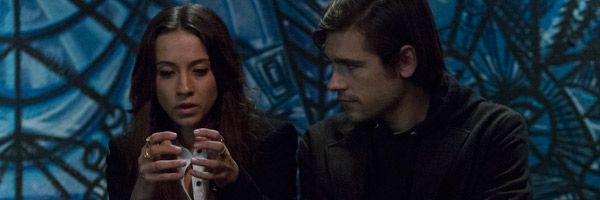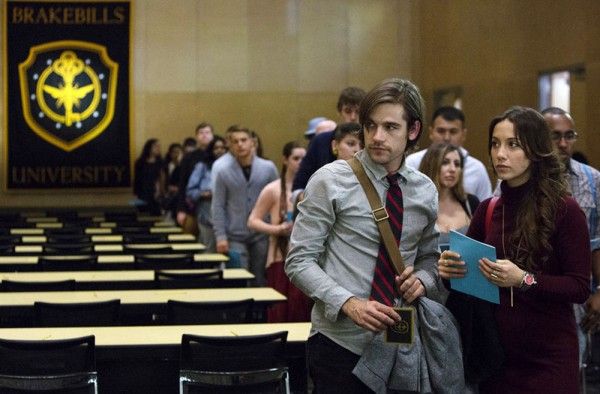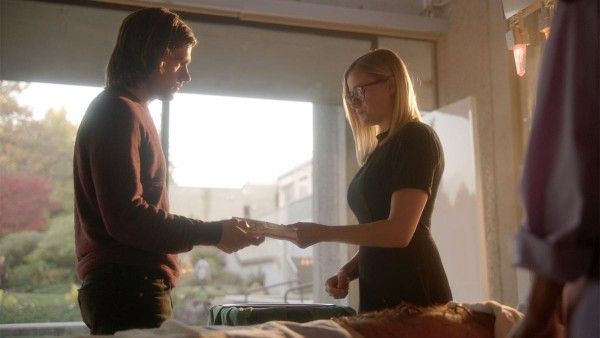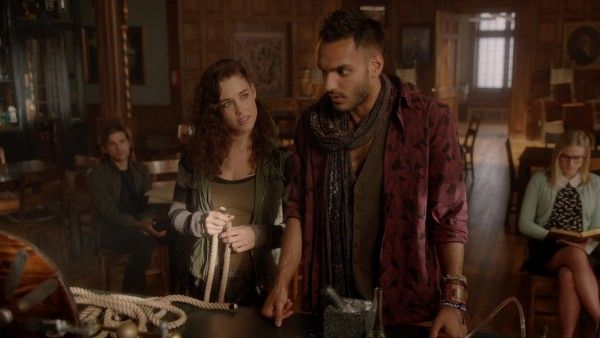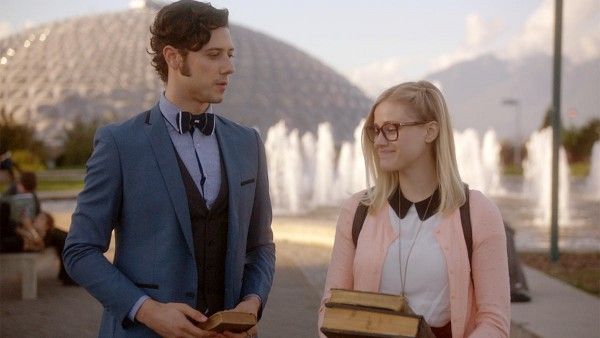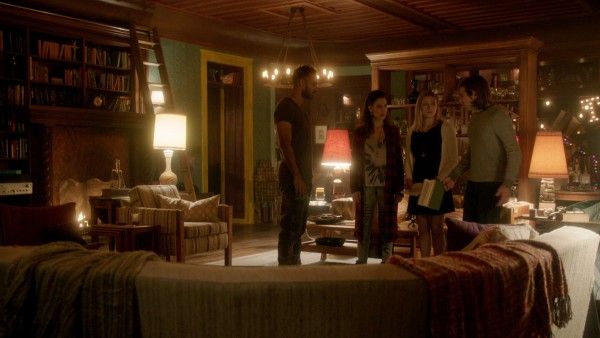Author Lev Grossman’s The Magicians trilogy of novels is one of the best and most satisfying reads I’ve ever encountered. It’s a fantasy series about fantasy series, but it’s really about being human, and all the faults that lie therein. As Grossman covers the arc of a disillusioned young man named Quentin—who discovers magic is real, and that he himself possesses the qualities necessary to become a magician via the Brakebills School of Magic, seemingly providing the fulfillment he’s spent his life looking for—the author approaches the material with a maturity and honesty that’s lacking in many similar-sounding books. As the world of The Magicians expands over the course of the trilogy, Grossman doesn’t shy away from the pain of depression, the blinding quality of selfishness, and the reality of forging real, adult relationships, which makes the story that much more compelling and emotional, all under the guise of a “fantasy” book.
As a deep fan of the book series, I approached the Syfy TV series adaptation with cautious optimism. There are so many ways a Magicians TV show could turn out great, but just as many ways it could go terribly wrong. Would the show be patient enough to allow the characters’ dimensionality to flourish? How would they handle the twists and turns that delve deeper and deeper into fantasy territory while still maintaining the show’s humanity? And would the mature themes be sidelined for fear of being too dark or adult for cable TV?
When the first episode finally aired, my worst fears had been realized. The tone seemed unsure of itself, and the casting of Olivia Taylor Dudley as fellow Brakebills student Alice—who in the books is described not as physically striking, but as somewhat invisible, blending into the crowd—had seemingly been given the Laney Boggs treatment: a gorgeous woman who was “transformed” into bookish by simply wearing glasses. And then there was Penny, another fellow student and contentious rival to the neurotic Quentin who was supposed to be a whiny jerk, and had somehow morphed into a genuinely cool, kind of badass prick. And why were we following Julia’s story? Julia—a childhood friend of Quentin’s who doesn’t pass the test to get into Brakebills, but spends her time on the outside obsessing over getting in—isn’t supposed to come back until the second book, so that seemed like Season 2 material at best.
Initially, I came away from the pilot frustrated that so many changes had been made to the source material I loved so dearly. But I was determined to keep watching, mainly out of curiosity. Besides, Jason Ralph’s performance as Quentin was actually kind of compelling, even if they were too on-the-nose with the character’s bouts of depression by putting him in a mental institution in the opening scenes.
But as I kept watching, a funny thing happened. I started to embrace the show’s changes from the book. I realized I had become one of “those” people, always complaining that the books are better and explaining that the show can’t do X because the books do Y. Admittedly, the pilot had issues beyond altering the source material, but as the show wore on, showrunners Sara Gamble and John McNamara began carving their own path through The Magicians saga, and it seemed clear that the actors started to feel more comfortable in their roles. I’m still not completely onboard with this iteration of Alice just yet, but it’s getting better each week, and Hale Appleman’s eccentric Eliot is a darn delight.
With adaptations, changes are necessary. A book is not a TV series and a TV series is not a film, and so on. There are things you can do in one medium that don’t translate well to another. I had always lauded the Harry Potter franchise and author J.K. Rowling for allowing the filmmakers and writers to put their own stamp on the material, and in my passion for Grossman’s source material, I lost sight of the fact that TV shows often take some time before settling into a groove.
We’re now 9 episodes into the 13-episode first season of The Magicians, and while the show has rearranged massive portions of the trilogy and created characters that don’t exist in the books, most of these changes have turned out for the better. It’s essential to tell Julia’s story at the same time as Quentin’s, because the juxtaposition of her (very different) experience with magic not only further expands the world of The Magicians, but also reinforces the entitlement and selfishness of Quentin—not to mention the fact that Stella Maeve's performance is terrific. And since the Penny of the show is more essential and present in the ensemble than the Penny of the books, making him more dissimilar from Quentin brings more diversity to the cast of characters (not to mention Arjun Gupta’s performance as Penny fleshes out this iteration of the character as more complex and, as a result, a better foil for Quentin). The inclusion of new characters like Kacey Rohl’s Marina and Jade Tailor’s Kady also allow the longform storytelling format of the TV series to remain engaging week to week, without burning through the story of Grossman’s novels.
The show has only improved as it’s gone on, with the most recent episode, “The Writing Room,” marking the show’s best episode to date. It’s a perfect showcase of how the series fully embraces Grossman’s books while also carving out its own path, slightly twisting the backstory of the book-series-within-a-book-series Fillory and Further so that it offers the opportunity for further storytelling while not skirting the more disturbing twist from the source material. (And kudos to Syfy for allowing the series to tackle such serious and adult subject matter within the context of a fantasy TV show).
I used to roll my eyes at A Song of Ice and Fire book fans who were continuously outraged when Game of Thrones would change this or that, but having now gone through the same experience with The Magicians, I get it. When you love a book or a book series this much you feel connected to it, and it’s strange to see it changed or altered in any significant way; it feels personal. But what The Magicians does so well is stay true to the heart and nature of Grossman’s books while also keeping the storytelling fertile for hopefully many more seasons of TV.
Though I was skeptical, maybe even a little disdainful at first, The Magicians has grown on me both as an adaptation and as a standalone show. It’s some of the most interesting storytelling happening on TV right now, with unique, fascinating characters and challenging themes all wrapped up in the visually dynamic world of magic. That may not sound like your average Syfy series, but it’s true—and let’s not forget, this is the network that also gave us Battlestar Galactica. Sure there’s always the possibility that as the show continues (it’s already been renewed for a second season) it could go astray, but for now Gamble and McNamara have won over this passionate Magicians fan and earned the benefit of the doubt.
Listen, I get it, change is hard. But sometimes, every once in a while, a property will fall into the right hands, ones that will mold and shape that thing you enjoy into a wholly separate other thing you enjoy. The source material will always exist—no amount of change can undo that. And if a genuinely good adaptation comes about, as in the case of The Magicians, you may just end up with two things to love.

